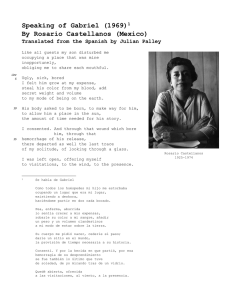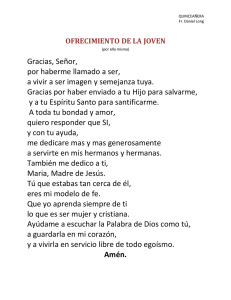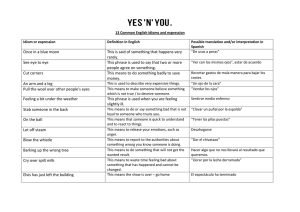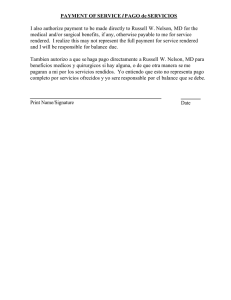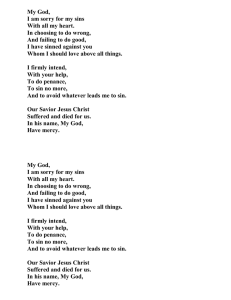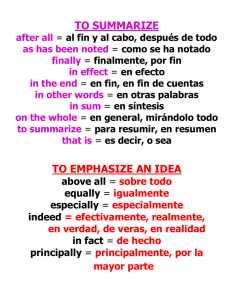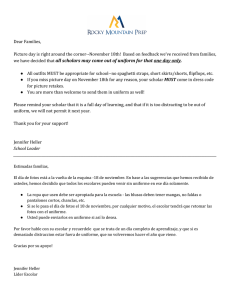Capítulo 1 Lección 3 - why unlimited spanish?
Anuncio
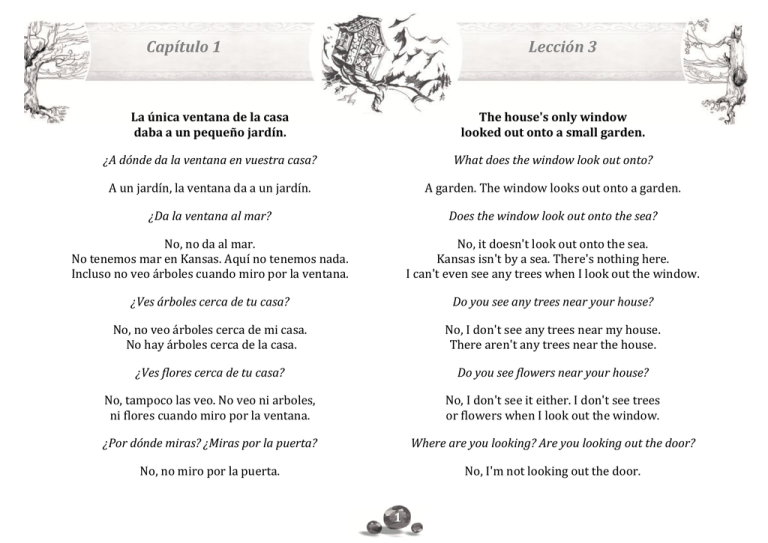
Capítulo 1 Lección 3 La única ventana de la casa daba a un pequeño jardín. The house's only window looked out onto a small garden. ¿A dónde da la ventana en vuestra casa? What does the window look out onto? A un jardín, la ventana da a un jardín. A garden. The window looks out onto a garden. ¿Da la ventana al mar? Does the window look out onto the sea? No, no da al mar. No tenemos mar en Kansas. Aquí no tenemos nada. Incluso no veo árboles cuando miro por la ventana. No, it doesn't look out onto the sea. Kansas isn't by a sea. There's nothing here. I can't even see any trees when I look out the window. ¿Ves árboles cerca de tu casa? Do you see any trees near your house? No, no veo árboles cerca de mi casa. No hay árboles cerca de la casa. No, I don't see any trees near my house. There aren't any trees near the house. ¿Ves flores cerca de tu casa? Do you see flowers near your house? No, tampoco las veo. No veo ni arboles, ni flores cuando miro por la ventana. No, I don't see it either. I don't see trees or flowers when I look out the window. ¿Por dónde miras? ¿Miras por la puerta? Where are you looking? Are you looking out the door? No, no miro por la puerta. No, I'm not looking out the door. 1 Capítulo 1 Lección 3 Miro por la ventana. I'm looking out the window. ¿Cuántos árboles ves cuando miras por la ventana? How many trees do you see when you look out the window? Ninguno. No veo ningún árbol cuando miro por la ventana. None. I don't see any trees when I look out the window. ¿Por qué no ves árboles? ¿Crees que tienes mala visión? Why don't you see any trees? Do you think you might have bad eyes? No, no creo que tenga mala visión. No veo árboles por la ventana porque no los hay. No hay árboles cerca de la casa. No, I don't think that I have bad eyes. I don't see any trees outside the window because there aren't any. There aren't any trees near the house. ¿Hay árboles y flores en Kansas? Are there trees and flowers in Kansas? Sí, creo que sí. Pero probablemente estén muy lejos. Es probable que los árboles y las flores estén lejos de mi casa. Aquí no hay nada. Incluso la hierba es de color gris. Yes, I think so, but they're probably very far away. The trees and the flowers are likely far away from my house. There's nothing here. Even the grass is grey. ¿Qué color tiene la hierba de cerca de tu casa? ¿Verde? What color is the grass near your house? Green? No, verde no. Gris. La hierba de cerca de mi casa es de color gris. No, not green. Grey. The grass near my house is grey. ¿Crees que la hierba normalmente tiene color gris? Do you think that grass is usually grey? 2 Capítulo 1 Lección 3 No, no lo creo. No creo que normalmente la hierba tenga color gris. Creo que normalmente tiene color verde. No, I don't think so. I don't think that grass is usually grey. I think that it's usually green. ¿Es verde la hierba de cerca de tu casa, verdad? The grass near your house is green, right? No. No es así. Su color no es verde sino gris. El color de la hierba es gris. Todo en nuestras vidas es de color gris. No. It isn't. It's not green, it's grey. The color of the grass is grey. Everything in our lives is grey. ¿Qué cosa en vuestras vidas tiene color gris? What things in your life are grey? Todo. Todo en nuestras vidas tiene color gris porque todo es triste. Everything. Everything in our lives is grey because everything is sad. ¿Por qué todo en vuestras vidas tiene color gris? Why is everything in your lives grey? Porque todo en nuestras vidas es triste. Because everything in our lives is sad. ¿Crees que todo es divertido en vuestras vidas? Do you think that everything in your lives is fun? No, no creo que todo sea divertido. En cambio, creo que todo es triste. No, I don't think that everything is fun. On the contrary, I think that everything is sad. El tío Henry y la tía Em trabajan todo el día. Uncle Henry and Aunt Em work all day. ¿Qué hacen tus tíos todo el día? What do your uncle and aunt do all day? 3 Capítulo 1 Lección 3 ¿Trabajan o duermen? Do they work or do they sleep? Trabajan. Ellos trabajan todo el día. No tienen tiempo para dormir. They work. They work all day. They don't have time to sleep. ¿Trabajan ellos durante la noche o durante el día? Do they work during the night or during the day? Durante el día. Ellos trabajan durante el día. Trabajan todos los días. During the day. They work during the day. They work every day. ¿Cuándo trabajan tus tíos? ¿De vez en cuando o cada día? When do your uncle and aunt work? Once in a while or every day? Cada día. Ellos trabajan cada día. Es lo mismo que decir “todos los días”. Every day. They work every day. ¿Entonces, cuánto trabajan? ¿Mucho o poco? How much do they work then? A lot or a little? Mucho. Mis tíos trabajan mucho. De hecho, trabajan demasiado. A lot. My uncle and aunt work a lot. They actually work too much. ¿Quieres que trabajen más tus tíos? Do you want your uncle and aunt to work more? No. No lo quiero. Ellos ya trabajan demasiado y no quiero que trabajen más. No. I don't. They already work too much and I don't want them to work even more. 4 Capítulo 1 Lección 3 ¿Quién trabaja todo el día? ¿Trabajas tú todo el día? Who works all day? Do you work all day? No, yo no. Yo no trabajo todo el día. Mis tíos son quienes trabajan todo el día. Empiezan el trabajo muy temprano por la mañana y no terminan hasta la noche. No, not me. I don't work all day. My uncle and aunt are the ones who work all day. They start to work very early in the morning and don't stop until nighttime. ¿Qué empiezan tus tíos por la mañana? ¿Empiezan a jugar? What do your uncle and aunt start to do in the morning? Do they start to play? No, no empiezan a jugar. Empiezan a trabajar. Ellos empiezan a trabajar muy temprano por la mañana. No, they don't start to play. They start to work. They start to work very early in the morning. ¿Empiezan a trabajar muy tarde? Do they start to work very late? No, tarde no. Ellos empiezan a trabajar muy temprano. Lo que hacen hasta tarde es trabajar. Mis tíos paran de trabajar muy tarde, por la noche. No, not very late. They start to work very early. What they do until late in the day is work. My uncle and aunt stop working very late, at night. ¿Quieres decir que tus tíos acaban el trabajo muy tarde? Do you mean that your uncle and aunt finish their work very late? Sí, eso es. Mis tíos acaban o terminan de trabajar muy tarde, por la noche. Yes, that's right. My uncle and aunt stop or finish working very late, at night. 5 Capítulo 1 Lección 3 ¿Qué terminan de hacer tus tíos por la noche? ¿Dormir? What do your uncle and aunt finish doing at nighttime? Do they finish sleeping? No, no terminan de dormir. Ellos acaban de trabajar por la noche y nunca se ríen. No, they don't finish sleeping. They finish working at night and they never laugh. ¿Siempre se ríen tus tíos? Do your uncle and aunt always laugh? No, ellos no se ríen nunca. No, they never laugh. ¿Te gusta que no se rían? Do you like it that they don't laugh? No, no me gusta que ellos no se rían. Me gustaría que se rieran más a menudo. No, I don't like it that they don't laugh. I wish that they would laugh more often. ¿Se ríen a menudo? Do they laugh often? No, no se ríen a menudo. Ellos no se ríen nunca, jamás. No, they don't laugh often. They never ever laugh. ¿Nunca lloran tus tíos? And they never cry? No, yo no he dicho eso. Lo que digo es que mis tíos nunca se ríen. Tienen demasiado trabajo. No, I haven't said that. What I'm saying is that they never laugh. They have too much work to do. 6 Capítulo 1 Lección 3 La historia The Story La única ventana de la casa daba a un pequeño jardín. The house's only window looked out onto a small garden. Pero cuando Dorothy miraba por la ventana no veía ni árboles ni flores cerca de la casa. But when Dorothy looked out the window, she couldn't see any trees or flowers near the house. Ni siquiera la hierba era verde sino gris. Even the grass wasn't green, it was grey. Todo en sus vidas tenía color gris y era triste. Everything in their lives was grey and sad. El tío Henry y la tía Em trabajaban todo el día. Uncle Henry and Aunt Em worked all day. Empezaban muy temprano por la mañana, paraban de trabajar tarde, ya de noche, y nunca se reían. They began very early in the morning, stopped working late, when it was already nighttime and they never laughed. 7

